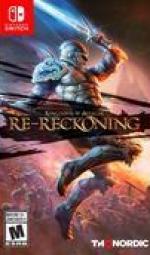
Thank Chafee
Let me preface this review by saying that I despise American politics to the point where I don’t even look at newspapers for fear of them triggering my dark side, and don’t bother browsing sites such as Twitter. I hate it even more when the topic injects itself into nonpolitical subjects such as videogames, although there are rare cases where the topics intersect in a good way, such as Texas politicians providing initiatives to Austin-based game developers, or a loan from the State of Rhode Island financing the development of Kingdoms of Amalur: Reckoning, which would see a remaster entitled Kingdoms of Amalur: Re-Reckoning, allowing a new generation to experience the Western RPG.
Like the original version Re-Reckoning features deep lore by fantasy author R.A. Salvatore, which is very engaging to the point where even subquests add significantly to the narrative. The game itself begins, unusually, with the player’s character’s death, although the gnomish scientist Fomorous Hugues revives this protagonist, the “Fateless One,” after which the hero embarks on a quest through the Faelands, one of the titular Kingdoms of Amalur, to discover the circumstances of their initial demise and life beforehand. The plot definitely helps the game well, although there are some played fantasy tropes such as the quest for immortality and general lack of distinction from other fantasy mythos.
Fortunately, the gameplay helps Re-Reckoning far more than hurts, with the player creating a customized protagonist of one of four playable races when starting a new game. Players begin as “Fateless,” although they can, when their character levels, invest points (three per level) into one of a trio of skill trees, corresponding to warrior, rogue, and mage classes, each with plenty active and passive abilities. The player also gets to invest one point when leveling into another breed of skills that decide things such as how much money they receive from selling excess items and how much detail the helpful minimap shows such as Lorestones that grant a pinch of experience and supplemental backstory.
Players can also wield a variety of different weapons such as swords, hammers, bow and arrows, knives, chakrams, and staves, with the gameplay generally devolving to hacking and slashing enemies regardless of armament, although charge attacks ultimately become available for each method of attack, as do mana-consuming abilities with active and passive actions, some of which the player can have “sustained,” consuming a fixed percentage of their maximum magic points for a neverending effect. Other notable magic includes one spell from the mage tree that can temporarily summon an AI-controlled skeleton ally that fights alongside the Fateless One.
Difficulty in Re-Reckoning is adjustable to fit different player skill levels, the game mechanics work well, the camera being an issue, and the lack of targeting akin to the Kingdom Hearts series not hurting at all. Battles tend to flow smoothly and accommodate many different playstyles, especially with the different skill trees, and there’s plenty of fun to have. Pretty much the only real issues are that gaining experience bonuses from Reckoning mode (which temporarily increases attack power) requires a great deal of button-mashing, and the player can’t always put up their shield to defend enemy attacks.
The remaster is generally user-friendly, with the rare ability to skip voiced text during most cutscenes, accommodating to hearing-impaired gamers. There’s also an in-game clock as well as fast-travel among visited areas of interest, although there are some points where instant conveyance is unavailable, namely in the middle of dungeons. While the direction on how to advance the main storyline and most subquests is generally clear as well, there are maybe a handful of moments where the player might find themselves needing to use a guide. Regardless, the game generally interacts well with players.
Probably the weakest aspect of Re-Reckoning is its audio presentation, given the relative lack of memorable music akin to many prominent Japanese RPGs, although there is good orchestration and excellent voice acting.
The remaster, however, fares better visually, with good colors and details such as different equipment affecting the protagonist’s appearance, realistic environments, character and enemy models with believable anatomy, and the like. There is a bit of choppiness, environmental popup, and some occasional blurry and pixilated texturing, but otherwise, the game is far from an eyesore.
Finally, while there is a great plethora of side content to prolong the experience, the remaster surprisingly doesn’t feel padded at all, especially due to things like fast-travel, and there’s plentiful lasting appeal in said extra material, although the Nintendo Switch, as usual, lacks achievements.
Overall, Kingdoms of Amalur: Re-Reckoning is a worthwhile remaster that hits most of the right notes with its gameplay, control, well-developed lore, and good graphics, with only a few areas in which it fumbles such as fast-travel not always being available, the lack of distinction from other fantasy settings, the unmemorable soundtrack, and a few technical issues with the visuals. Although the original version sold over a million copies, it was so overbudget it didn’t break even financially, causing some controversy in Rhode Island in the original’s time, but that it’s a great game largely compensates for that, and one could consider it a certain former Senator and Governor’s greatest accomplishment.
This review is based on a playthrough of a copy purchased by the reviewer.
The Good:
+Excellent game mechanics.
+Tight control.
+Deep lore.
+Nice visuals.
The Bad:
-Fast travel not always available.
-Not a whole lot of distinction from other fantasy settings.
-Soundtrack generally unmemorable.
-Some technical hiccups with graphics.
The Bottom Line:
A great Western RPG.
Score Breakdown:
Platform: Nintendo Switch
Game Mechanics: 9.5/10
Controls: 8.5/10
Story: 8.5/10
Music/Sound: 8.0/10
Graphics: 8.5/10
Lasting Appeal: 9.0/10
Difficulty: Adjustable
Playing Time: 30-60 Hours
Overall: 9.0/10
No comments:
Post a Comment